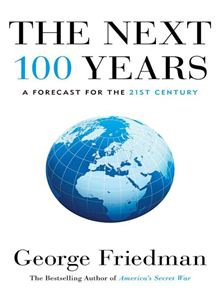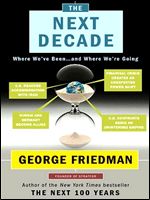
 It would be an incomplete picture to review George Friedman’s The Next Decade without referring to its predecessor The Next 100 Years. For those who assume that the forecasts for the next decade are a mere subset or pilfering from the more extended work, they would be mistaken. Friedman puts it this way: ‘A century is about events. A decade is about people.’
It would be an incomplete picture to review George Friedman’s The Next Decade without referring to its predecessor The Next 100 Years. For those who assume that the forecasts for the next decade are a mere subset or pilfering from the more extended work, they would be mistaken. Friedman puts it this way: ‘A century is about events. A decade is about people.’
Friedman deals with the science of geopolitics. Broadly, this involves the changing relationships between nation states and what ramifications these shifts have over the longer term, ie Big Picture stuff. US historian Paul Kennedy’s work, The Rise and Fall of the Great Powers, remains a definitive work in this field.
While Kennedy encourages us to learn from history, Friedman gets busy constructing possibilities for the future based on strategic and political logic highly reminiscent of Sherlock Holmes’ ‘when all impossibilities are eliminated, only the possible remains’.
For anyone sensitive about US dominance, these books should come with an apoplexia warning. All Friedman’s theories revolve around the pivotal importance of the US and its control of the world’s oceans, and towards the end of the century, space. In Kennedy’s terminology, we live in the pax Americana, whether we like it or not.
Friedman argues that three countries will vie for domination of their own regions. Poland has always been a battleground between Germany and Russia but will garner future support from the US to keep it neutral; Turkey’s geographical position speaks for itself; and Japan. Friedman also presents a set of very cogent arguments as to why China will never reach that point (in fact he believes it may not even hold together as one country long term). Likewise, he argues that the US will not go into decline as is widely mooted, but go on to greater heights, thanks to its dominance in technology helping it break the hegemonic rise and decline cycle (Kennedy’s central thesis). Even if you don’t agree, it’s very stimulating food for thought.
Another chewy nugget that Friedman throws us is the fact that ever since history was recorded, the story of the world has been about growth, driven by population. He points out that we are entering unknown territory where that phenomenon will no longer exist and what the implications might be. One of many predictions is that the US will be paying Mexicans to immigrate by the end of this century.
For anyone who fancies a reverse history lesson, this is all heady stuff, even if it does get a bit fanciful near the end…but then HG Wells also seemed like a complete nutter to some of his contemporaries.
The second book is far more US-centric and more aggressive and prescriptive in its predictions of US behaviour. Much more hackle-raising than the first, if you are that way inclined. What makes this study so fascinating is Friedman’s assumptions about the real motivation of strategic decisions and his open discussion of the lies and deceptions which must occur for the ‘greater good’. One gets the sense that he is revealing top-secret strategic advice to the president – for example, openly admitting to playing off Germany and Russia against each other to neutralise their respective threats, and even more surprising, why the US will distance itself from Israel.
There is a lot of tiresome talk about idealism vs realism and America’s balancing act of managing an empire while not admitting that it has one. Lincoln, Roosevelt and Reagan are constantly cited as examples of presidents who lied and deceived for the greater long term good. A topical example is where, even though he knows terrorism can never be wholly defeated, the president must always talk as though it can be, otherwise people will lose faith and be frightened, with all the economic and political implications that can bring.
To sum up, this book is basically about how the US will further its own agenda in the next ten years, but in doing so, how it will promote world stability by ensuring threatening powers have counter balances to keep them in check (eg Pakistan and India) or alternatively, stimulate enough hostility between neighbouring powers to stop them joining forces and challenging the US (eg Russian resources with European technology). It certainly provides a concise tour of the world’s current strategic hot spots and how the US may deal with them (or not).
Friedman says that the next decade ‘will not be an exuberant one’. After reading what he thinks is in store over the next few decades, this may be no bad thing.

Comments
Total Comments : ( ) You have to register to post a comment.
RECENT COMMENTS